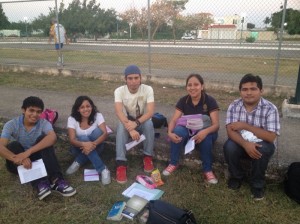When speaking evangelistically in a university context, I want to deal with issues that are relevant to students while also showing that the Bible speaks relevantly into these issues. Questionnaires helped identify some themes which connect with students, e.g. identity, achievement and self-esteem, relationships, meaning of life, death.
 I start my talks with the deeper questions which lie behind the theme: How do we build identity and self-esteem? What does it mean to live in a society which builds identity on achievement: I achieve, therefore I am? What does this do to our society, to our relationships, to our self? So I raise questions, give an analysis, and look at the answers given to us by current trends in our society. Then I relate the issue to a passage from Scripture explaining how God comes into the picture and why together we will look at a biblical text.
I start my talks with the deeper questions which lie behind the theme: How do we build identity and self-esteem? What does it mean to live in a society which builds identity on achievement: I achieve, therefore I am? What does this do to our society, to our relationships, to our self? So I raise questions, give an analysis, and look at the answers given to us by current trends in our society. Then I relate the issue to a passage from Scripture explaining how God comes into the picture and why together we will look at a biblical text.
My reasons for opening up the Bible with students in this context are:
- I want students to start exploring the Bible by themselves – often we distribute gospel copies in the lecture hall and read the passage together;
- I do not just want to talk about ‘God’, but want people to encounter Jesus. God revealed himself in a person and I want people to meet this person by inviting them to look at the reports about his life;
- I am convinced that the Holy Spirit wants to make the words of the Bible come alive in people’s hearts.
I achieve, therefore I am. What would be a good gospel passage to help people understand that God is different and treats us differently from our society? In Matthew 20:1-16, Jesus tells a story that reveals the character of God. It comes as quite a surprise, if not as a shock: He treats us according to his goodness and not according to our achievements. But his goodness also reveals our evil heart: Are you envious because I am generous?
By relating a gospel story to the theme, I want students to understand that Jesus is relevant to their lives. Here are some other examples of how I have linked themes with Bible passages:
- Relationships (just being used by others; healing and forgiveness); Luke 7:36-50.
- Die happy: Let us eat and drink because tomorrow we are dead: Luke 12:16-19.
- Religion (contrasted with the reality of Jesus): Philippians 2:5-11.
Encountering Jesus in these stories has led many students to read one of the gospels by themselves. In this way, God’s Word itself becomes the evangelist.
IFES Associate General Secretary
martin.haizmann(at)ifesworld.org


 Over the years, this practice has caught on across the region. At the student leaders’ retreat in Singapore (2014), God used this time of selah to break into their hearts. It was a time of being convicted together and listening to what God really wanted to do through their fellowship.
Over the years, this practice has caught on across the region. At the student leaders’ retreat in Singapore (2014), God used this time of selah to break into their hearts. It was a time of being convicted together and listening to what God really wanted to do through their fellowship.



 Scripture engagement involves listening and responding to God. We know so much, yet struggle to translate it into life – many of us have big heads, but small feet. But a response is essential. God’s Word was not given to make smart students out of us, but lovers and disciples of Jesus who incarnate his Gospel in a lost and broken world.
Scripture engagement involves listening and responding to God. We know so much, yet struggle to translate it into life – many of us have big heads, but small feet. But a response is essential. God’s Word was not given to make smart students out of us, but lovers and disciples of Jesus who incarnate his Gospel in a lost and broken world. that after reading through the Bible, students would start to appreciate the big picture and see how individual passages fit into this context.
that after reading through the Bible, students would start to appreciate the big picture and see how individual passages fit into this context.